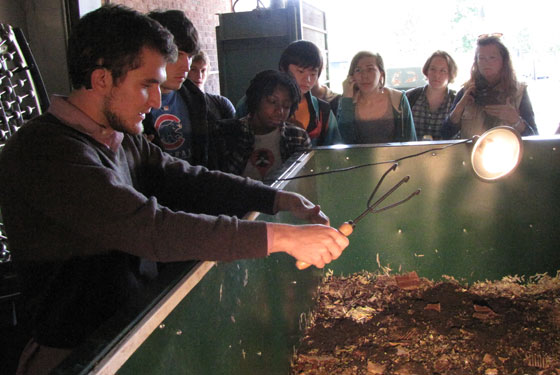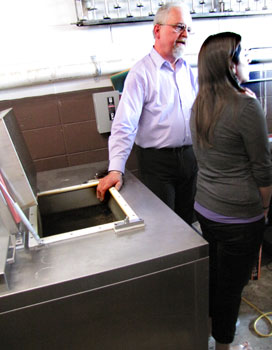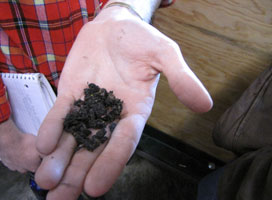

Venture Boldly

Adriana Colindres
Features Editor
2 East South Street
Galesburg, IL 61401


Josh Davidoff '10 shows Knox students the worm composting bin
Knox College is enhancing its sustainability efforts by launching a new program to convert food waste into compost -- with the help of thousands of "red wiggler" worms.
Each year, the program will transform about 60,000 pounds of waste that otherwise would go into a landfill.
The worms recently began making themselves at home in a bin on the Seymour Union loading dock that contains moist soil and compost. They will need eight to 12 weeks to become acclimated to their surroundings, said Helmut Mayer, director of dining services at Knox.
The project has been in the works for more than a year as students on the Composting Committee have investigated different composting options for the Knox campus. The new composting system is expected to be fully implemented when Knox students return for fall term.
Funding sources for the project include the student Green Fee Fund, administered by the Student Senate Sustainability Committee, and a contribution from Knox President Roger Taylor, who chairs the President's Task Force on Sustainability.
 With the new system, post-consumer food waste -- leftover food -- from the Hard Knox Café and other Knox dining facilities will be collected and deposited into a machine called the eCorect Somat. The machine dehydrates, compacts, sterilizes, and heats the food to 290 degrees, producing a soil-like biomass called "soil amendment" that can be used alone as mulch and weighs 80 percent to 90 percent less than it did at the beginning. (Photo at left: Helmut Mayer displays the eCorect Somat.)
With the new system, post-consumer food waste -- leftover food -- from the Hard Knox Café and other Knox dining facilities will be collected and deposited into a machine called the eCorect Somat. The machine dehydrates, compacts, sterilizes, and heats the food to 290 degrees, producing a soil-like biomass called "soil amendment" that can be used alone as mulch and weighs 80 percent to 90 percent less than it did at the beginning. (Photo at left: Helmut Mayer displays the eCorect Somat.)
The soil amendment will be placed in the bin, along with pre-consumer waste such as vegetable peels and eggshells. The mixture serves as food for the worms, and it gradually turns into compost.
"In the fall, we should be able to add our waste every day," Mayer said. "Then when the worm bin gets full, we can remove some compost to add more (material) to the top."
The compost will be used on campus flower beds and the campus student garden. It will be available to Knox College faculty and staff for use in their gardens and any future on-campus farming project. Dining Services is also negotiating with local farmers to trade compost for lower-priced local produce, Mayer said.
A Knox post-baccalaureate fellow, Josh Davidoff '10, is working on the composting system this summer, and student workers will take up those responsibilities when classes resume in the fall. Davidoff, a member of the Composting Committee, spent months researching the idea of taking a two-pronged approach to composting and waste-reduction at Knox, using both the eCorect Somat machine and the worm composting bin.
The project is important for several reasons, according to Mayer and Davidoff.
"Just to have less trash go into the landfill is a great idea," Mayer said.
Davidoff added: "Knox is all about creating students that are conscientious and can better the community and the world around them."
Founded in 1837, Knox is a national liberal arts college in Galesburg, Illinois, with students from 48 states and 51 countries. Knox's "Old Main" is a National Historic Landmark and the only building remaining from the 1858 Lincoln-Douglas debates.
Published on May 25, 2011